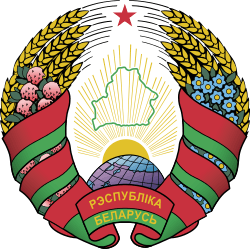Belarus–European Union relations
 |
|
European Union |
Belarus |
|---|---|
Belarus–European Union relations refers to relations between Belarus and the European Union. Mutual relations were initially established after the European Union recognised Belarusian independence in 1991. After the rise to power of Alexander Lukashenko in 1994, the relationship between Minsk and the EU deteriorated and has remained cold and distanced. Following a slight improvement in relations in 2008, the presidential elections in 2010 (which saw a landslide victory of almost 80% for Alexandr Lukashenka), led to mass demonstrations and arrests in Minsk. The EU declared that the imprisonment of opposition figures and protesters contravened human rights laws, and imposed new targeted sanctions on major Belarusian officials and businesspeople.[1][2][3][4][5]
Legal framework
Although the European Union and Belarus signed a Partnership and Cooperation Agreement (PCA) in 1995, which was intended to govern the mutual political and economic relations, this agreement was not ratified by the EU. Furthermore, the European Union has excluded Belarus from its European Neighbourhood Policy (ENP), which was originally designed to establish a "ring of friends" in the Union's geographical proximity. Brussels has claimed this exclusion to be a direct response to the establishment of an authoritarian regime under President Lukashenko. However, EU–Belarus trade relations are still covered by the Union's Generalised System of Preferences and the most favoured nation (MFN) provisions of the 1989 Agreement between the EU and the Soviet Union.[6] Belarus is amongst the few states in Europe that have not asked for membership in the European Union. Similarly, the European Union has not offered membership to Minsk.[7] Belarus has continuously sought to further its economic and political ties with Russia, being one of the founding members of the Union State (formerly the 'Union State of Russia and Belarus').
In October 2009, a poll conducted by the independent NISEPI institute in Belarus found that 44.1 percent of the Belarusian people would vote Yes in a referendum to join the EU, compared to 26.7 percent one year earlier. Local experts are linking the swing to more pro-EU messages in Belarusian state media, Polish daily Rzeczpospolita says.
See also
- Outline of the European Union
- Foreign relations of the European Union
- Foreign relations of Belarus
- Foreign Policy and Security Research Centre (Minsk, Belarus)
- INOGATE
External links
- Current analysis of Belarus-EU relations on Belarus Digest
- Changing Belarus (Chaillot Paper No.85) European Union Institute for Security Studies
- Back from the Cold? The EU and Belarus in 2009 (Chaillot Paper No.119) European Union Institute for Security Studies
- Belarusian News in english
- European partnership is one of external landmarks for Belarus Deutsche Welle (English version)
- Victor Shadurski (FPS): Belarus should develop economic and political ties with the EU First National Channel (Belarus) (English version)
- Kiryl Kascian. Belarus-EU Relations: Ad Hoc Actions vs. Pre-developed Strategy, Belarusian Review Working Paper, #2, November 2014
References
- ↑ 'Time to turn the page' on EU-Belarus ties: OSCE
- ↑ Belarus hopes to negotiate trade agreement with EC
- ↑ Lukashenko hails lifting of EU travel ban
- ↑ Dialogue between parliaments of Belarus, EU countries to continue developing
- ↑ EU customs services express interest in close cooperation with Belarus
- ↑ Agreement signed between European Community and Soviet Union 1989-12-18
- ↑ Korosteleva, E.A., “The Limits of the EU Governance: Belarus ' Response to the European Neighbourhood Policy”, Contemporary Politics, Vol. 15(2), June 2009, pp. 229–45
| ||||||||||||||||
